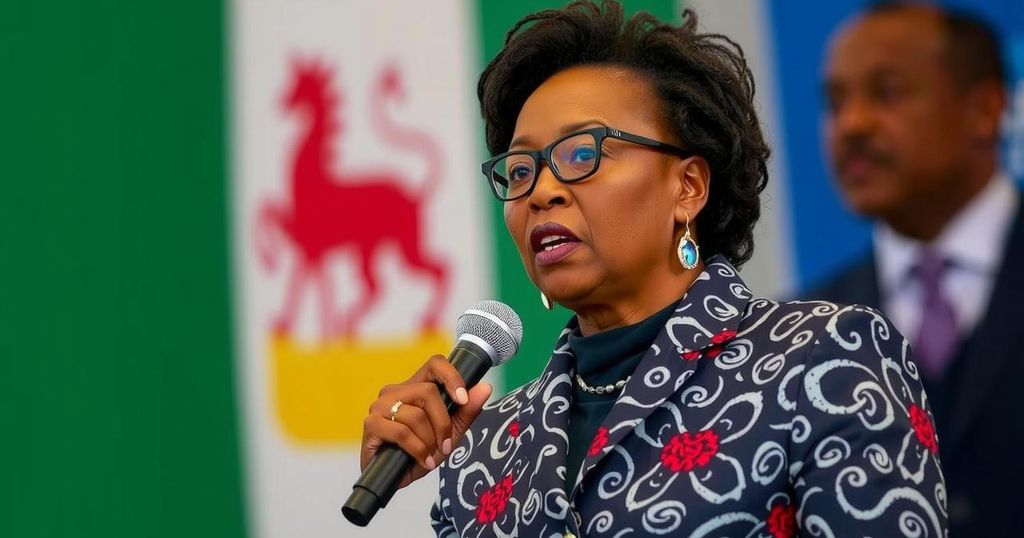Namibia’s Vice President Netumbo Nandi-Ndaitwah leads early results in a presidential election marked by voting irregularities that extended the election by three days, facing rejection from the opposition. Legal challenges are anticipated as public discontent with SWAPO grows due to economic issues. Final results are expected shortly, with the integrity of the election in question.
In the recent presidential election in Namibia, Vice President Netumbo Nandi-Ndaitwah of the ruling SWAPO party has emerged as the leading candidate, securing approximately 56% of the vote amidst significant technical difficulties that necessitated an extension of the voting period. The opposition parties have voiced their strong objections to the election results, characterizing the extensions as illegal and detrimental to the democratic process in a nation known for its relatively smooth electoral history. Final results are anticipated later this week, with legal challenges to the election expected from the opposition.
The election, which was characterized by a shortage of ballot papers and operational issues at polling stations, prompted the Electoral Commission to extend voting until Saturday. Nandi-Ndaitwah, at 72 years old, is vying to become Namibia’s first female president, with her primary opponent, Panduleni Itula of the opposition Independent Patriots for Change, garnering about 27% of the contested votes. Since gaining independence from apartheid South Africa in 1990, SWAPO has ruled Namibia, but rising discontent over economic struggles, particularly among the youth, has drawn criticism against the party.
The Independent Patriots for Change have announced plans to legally contest the election results, reflecting widespread concerns within opposition ranks about the electoral integrity. McHenry Venaani, leader of the Popular Democratic Movement and a fellow presidential candidate, emphasized the need for accountability in governance, asserting, “It is about our country, it’s about our democratic credentials, it’s about the country that must work for everybody, the poor and the rich. It cannot only work for those who want to remain in power by hook or (by) crook.”
The situation in Namibia follows a broader pattern of electoral discontent in southern Africa, where several ruling parties have faced public opposition and significant losses in recent elections. While SWAPO seeks to maintain its political dominance, the rising dissent highlights an urgent demand for change within the electorate, who are increasingly impatient with economic challenges and governance issues.
Despite the call for a rerun by the opposition, the Electoral Commission of Namibia maintains that there will be no repeat elections under the current circumstances. The coming days will be crucial for establishing the legitimacy of the election results and the direction of Namibia’s political landscape moving forward.
Namibia, a southern African nation, has been governed by SWAPO since it gained independence from apartheid South Africa in 1990. Historically, the country is recognized for its stable democracy and smooth electoral processes. However, the recent presidential election has been marred by technical difficulties, including ballot shortages, prompting a controversial three-day extension for voting. This has led to intense backlash from opposition parties who claim that such measures jeopardize the legitimacy of the electoral process. As the economy grapples with high unemployment rates, especially among the younger population, the SWAPO party faces growing scrutiny and resentment from an electorate dissatisfied with the government’s handling of economic issues and persistent corruption allegations. The balance of power in the region has shifted recently, with other ruling parties also experiencing significant voter discontent and losses.
The ongoing political situation in Namibia underscores significant tensions between the ruling party and the opposition in the wake of a challenging presidential election characterized by serious logistical issues. With the leading candidate, Vice President Nandi-Ndaitwah, poised for a historic victory, the legitimacy of the election results remains uncertain as opposition parties prepare to challenge them legally. This scenario highlights the mounting pressure on SWAPO to address public grievances concerning economic management and governance integrity in light of evolving electoral dynamics across southern Africa.
Original Source: abcnews.go.com






